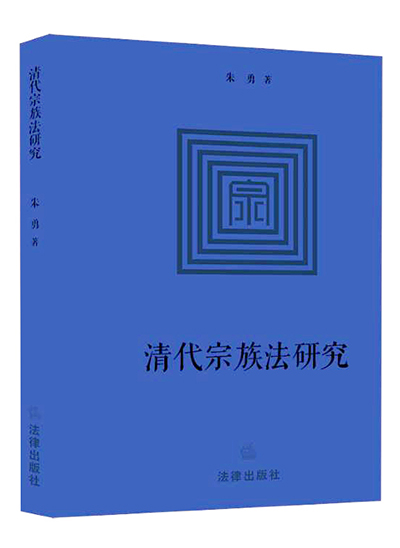A legal study of Qing’s patriarchal clan culture

A Study of Patriarchal Clan Law in the Qing Dynasty
For around a century, Chinese legal history has been overshadowed by Western legal theories and concepts, triggering academic concerns regarding the direction of Chinese legal science. In A Study of Patriarchal Clan Law in the Qing Dynasty, Zhu Yong, a professor from the Institute of Legal History at China University of Political Science and Law, emphasized that current research of Chinese legal history should return to its own traditions by generalizing and relocating traditional Chinese legal studies.
To introduce the unique Chinese patriarchal clan culture, the author first reviews three social phenomena with Chinese characteristics—the ruling method of “loving the public like loving one’s own children” in ancient officials’ political lives, “cohabiting and sharing wealth,” and “preemptive rights of relatives” in economic life, and the social performance of “filial piety” as an ideological concept. Highlighting ethical order and lineage, the patriarchal clan culture penetrated into a range of social relations in politics, economy, ideology, and culture, and generally affects the formation of a national consciousness, national character, and national habits.
The book elaborates upon the patriarchal clan culture’s system characteristics, features of patriarchal clan law, and its value in maintaining social stability and order. Through the lens of imperial Chinese traditions, it analyzes the theoretical value of the Qing-Dynasty (1644–1911) clan law, constructs legal concepts for clan law, and clarifies inherent “Chinese characteristics.”
Since the reform and opening up, Western anthropological trends have had a certain impact on Chinese legal history studies. In order to analyze rural social culture, American anthropologist Robert Redfield (1897–1958) proposed the dualistic analysis concept of “great” and “little” traditions in Peasant Society and Culture, which describes two coexisting traditions at different levels in a complex social culture. Influenced by this, domestic scholars proposed a “binary” or even “multiple” legal system framework in ancient China.
Zhu conducts an empirical study of clan law in the Qing era, and contrastively analyzes similarities and differences among the folk laws in Western European manor systems, Indian village community systems, and Chinese patriarchal clan systems. Based on these findings, the author constructs a “state-clan” dual legal system in imperial China, within the framework of an ancient Chinese agricultural society. The system focuses on the tension between opposition and unity of clan laws and state laws, providing reference for subsequent legal anthropology and folk law studies.
Yan Qiangle is from the School of Law at China University of Political Science and Law.
Edited by YANG LANLAN

 PRINT
PRINT CLOSE
CLOSE